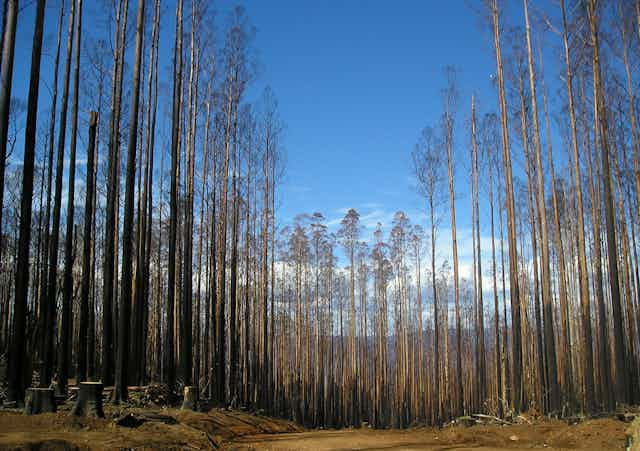Clearing forests is one of the major contributors to carbon dioxide emissions — something we’ll need to keep in check if we’re to have any hope of mitigating climate change. Recent research suggested that we could get the most out of forests by conserving big, old trees, which absorb and store more CO2 than younger trees.
But now our own research shows that, unfortunately, big old trees suffer reduced growth as temperatures climb, making the task of carbon storage considerably more difficult. This compounds the effects of premature tree death from bushfires and heatwaves in reducing carbon storage.
Carbon sinks
Plants are able to transform gaseous CO2 into organic matter through photosynthesis. It follows that trees, being the largest plants, play a crucial role in the global carbon cycle by absorbing and fixing carbon on a huge scale.
Deforestation has contributed to around one tenth of the CO2 emissions since pre-industrial times. Reducing forest clearance and restoring forest cover are therefore obvious ways to reduce anthropogenic greenhouse gas pollution and slow global climate change.
Recent research has also revealed that as well as storing more carbon, big old growth trees absorb more CO2 than smaller trees, making them particularly important carbon sinks.
Big trees suffer under the heat
However, we have now found that the growth of trees, and particularly big trees, may be substantially reduced under warmer climates.
There may be a couple of reasons why this might be so.
Plants may absorb CO2 through photosynthesis, but it’s important to remember that they also produce CO2 through respiration to create energy, just like animals do.
High temperatures reduce water availability by increasing evaporation. At the same time, the rate of respiration increases with higher temperatures, faster than the rate of photosynthesis. This produces more CO2 than at cooler temperatures.
Big trees also seem to be more vulnerable to water stress. And their large number of leaves compared to their mass may mean that the effect of faster respiration is greater for big trees than smaller trees.
It may be no coincidence that the world’s tallest trees, such as California’s redwoods and Australia’s mountain ash, are found in cool, moist forests.
Testing tall trees
To test the hypothesis that big trees grow less under warmer temperatures, we looked at half a million growth observations from more than 2000 permanent forestry plots in temperate and subtropical Australia.
We found that eucalypt tree growth declines with warmer climates, and this effect is most pronounced for larger trees.
For example, an increase in temperature from 11C to 21C was found to correspond to a 57% reduction in growth for tree with a 58 centimetre diameter trunk, but only 29% lower for trees with a 18 centimetre diameter trunk.
Growth isn’t the only way increasing temperatures affect trees. Warming climates are also associated with increased death rates of trees, especially seedlings.
We also know that warmer temperatures increase fire risk. Drying conditions result in frequent severe fires which in the worse can can completely eliminate some vegetation types, such as the alpine ash forests in the Victorian alps.
Combined, these effects suggest that the capacity of forests to serve as carbon sinks is constrained in a warmer world. Once temperatures increase beyond the tolerance of existing species, forests are likely to become a carbon source rather than a sink, creating a vicious cycle of increased carbon emissions and accelerating warming.
Restoration plantings may need to incorporate species that have higher tolerance for warmer temperatures than current native species. But really, the take home message is we must reduce CO2 emissions — forests can’t solve that problem alone.

